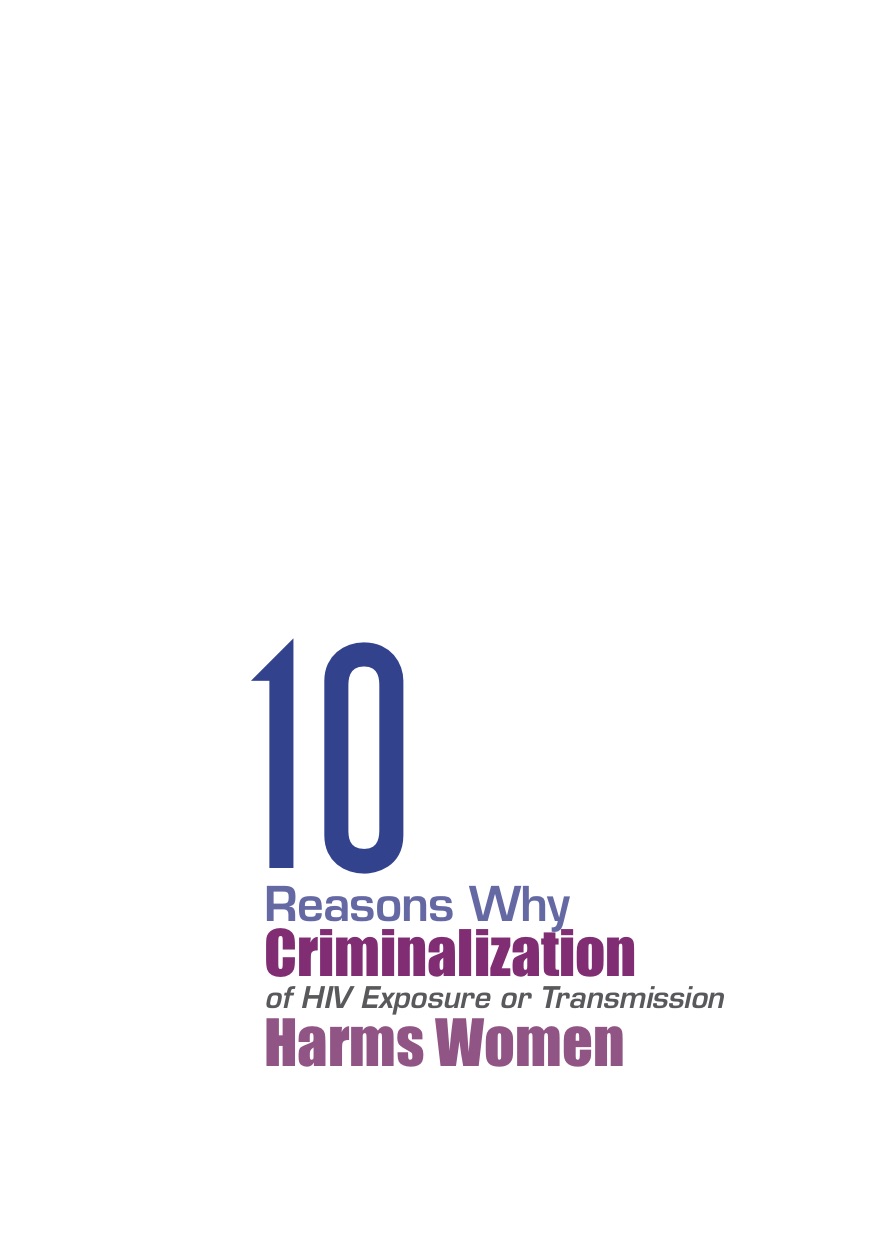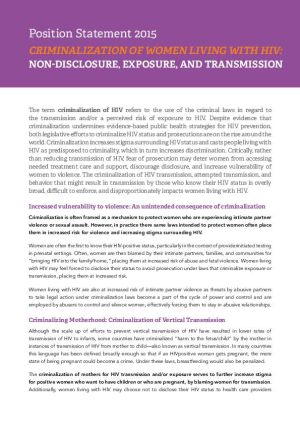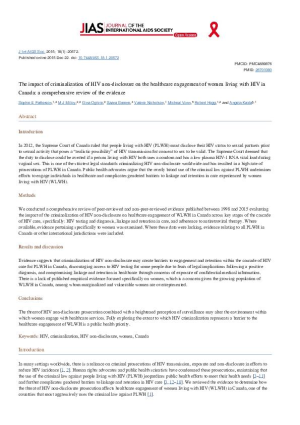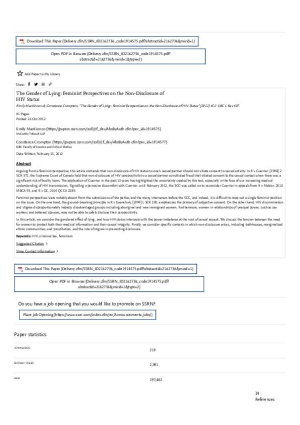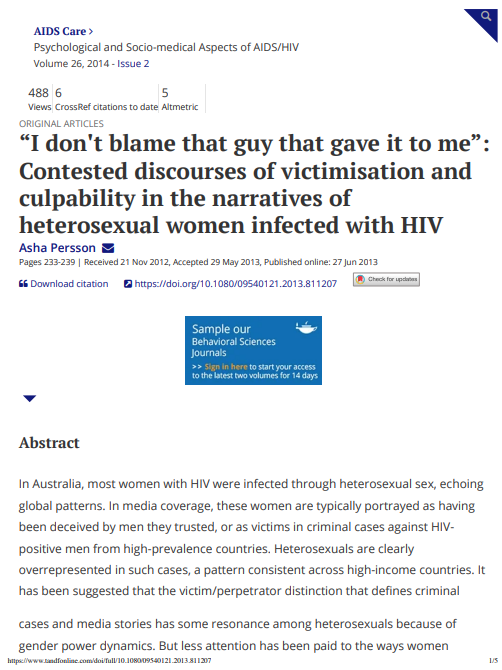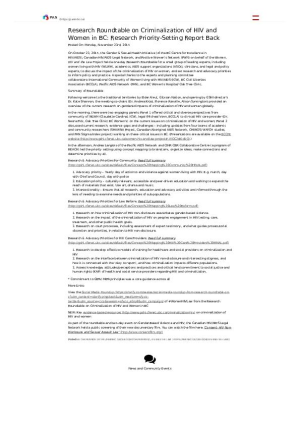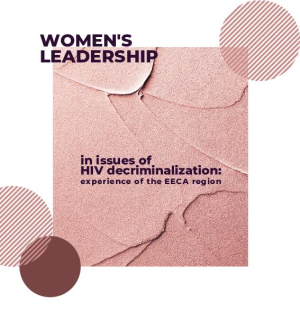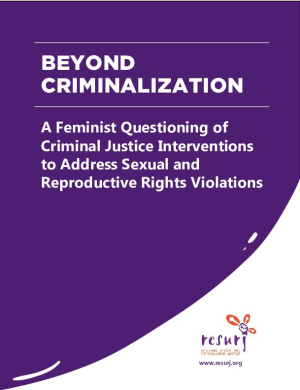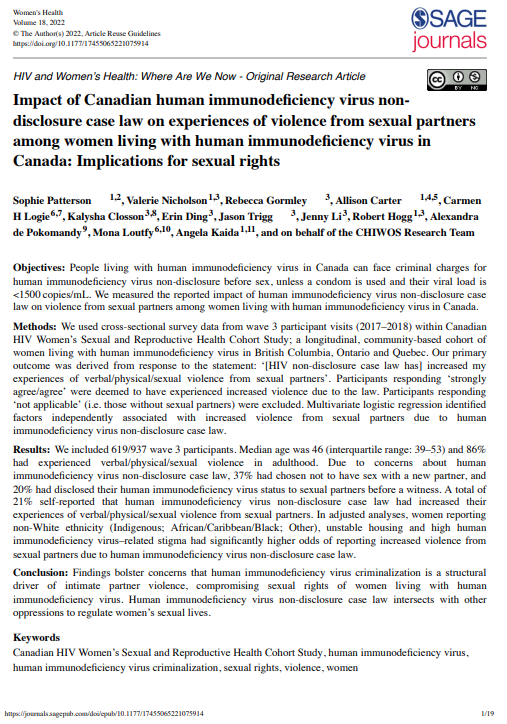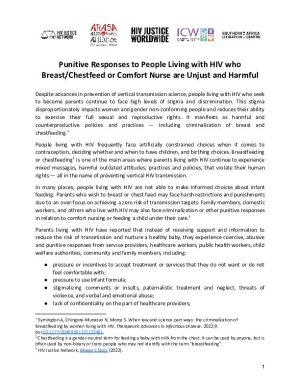Argues that applying criminal law to HIV exposure or transmission does nothing to address the epidemic of gender-based violence or the deep economic, social, and political inequalities that are at the root of women’s and girls’ disproportionate vulnerability to HIV.
Intersectionality
HIV criminalisation and women
International Community of Women Living with HIV (ICW) Position Statement on Criminalization of Women Living with HIV
Argues that criminalisation of women living with HIV for non-disclosure, exposure or transmission undermines public health strategies and increases risk of violence against women. Includes recommendations.
The impact of criminalization of HIV non-disclosure on the healthcare engagement of women living with HIV in Canada: A comprehensive review of the evidence
Concludes that HIV-related criminal laws either fail to influence or increase STI testing avoidance, unprotected anonymous sexual contacts, and avoidance of health care because respondents do not feel safe speaking with health professionals. Suggests HIV-related criminal laws compromise public health and clinicians’ abilities to establish therapeutic relationships and to undertake HIV prevention and treatment work.
The gender of lying: Feminist perspectives on the non-disclosure of HIV status
Arguing from a feminist perspective, this article contends that non-disclosure of HIV status to one’s sexual partner should not vitiate consent to sexual activity. Considers the gendered effect of lying, and how HIV status intersects with the power imbalance at the root of sexual assault. Discusses the tension between the need for women to protect both their medical information and their sexual integrity. Also considers the role of stigma in preventing disclosure.
“I don’t blame that guy that gave it to me”: Contested discourses of victimisation and culpability in the narratives of heterosexual women infected with HIV
Considers how heterosexual women living with HIV make sense of their HIV acquisition, challenging the victim–culprit binary. None of the women interviewed presented themselves as ‘victims’ in any straightforward sense or placed the blame squarely on the men who likely infected them, including men who had not disclosed. Instead, the women’s narratives revealed themes of “mutual vulnerability” and far more ambivalent allocations of responsibility. The tendency to position women who become infected with HIV as ‘victims’ obscures the complex realities of gender and sexual practice.
Results from the Roundtable on Criminalization of HIV and women in BC Priority Setting Day
Outlines the impact of the criminalization of HIV on women, and sets research and advocacy priorities to inform policy and practice.
Consent: HIV non-disclosure and sexual assault law
In their own words, eight women — leading feminist scholars, attorneys and women living with HIV — shine a light on the problems of using sexual assault law to prosecute alleged non-disclosure of HIV. Does the legal concept of consent, intended to protect women’s sexual autonomy, in fact increase their risk of violence and discrimination when used to criminalize HIV?
Women’s Leadership in issues of decriminalization: Experience of the EECA region
The compendium brings together research from the women's community, examples of documented personal stories and court cases. All the collected materials demonstrate how criminalisation of HIV is a global problem and how it is linked to gender-based violence. Experts believe that criminalising laws do not protect against HIV infection, but only make women worse off in society.
- Alternative links
- Женское лидерство в вопросах декриминализации ВИЧ: опыт региона ВЕЦА
Positive sexuality: HIV disclosure, gender, violence and the law—A qualitative study
Drawing on a feminist analytical framework and concepts of structural violence, this analysis sought to characterize the negotiation of sexual relationships and HIV disclosure among Women Living with HIV (WLWH) in a criminalized setting. Researchers conducted 64 qualitative interviews with cis and trans WLWH in Vancouver, Canada between 2015 and 2017. Despite frequently being represented as a law that ‘protects’ women, the study findings indicate that the criminalization of HIV non-disclosure constitutes a form of gendered structural violence that exacerbates risk for interpersonal violence among WLWH. In line with recommendations by, the WHO and UNAIDS these findings demonstrate the negative impacts of regulating HIV prevention through the use of criminal law for WLWH.
Beyond Criminalization: A Feminist Questioning of Criminal Justice Interventions to Address Sexual and Reproductive Rights Violations
The report presents the findings of the desktop research lead by the global south feminist alliance RESURJ, (Realizing Sexual and Reproductive Justice), as part of the alliance's leadership work on the shortcomings and limitations of penal policies in addressing sexual and reproductive rights violations. The aim of the review and this analytical report is to strengthen RESURJ’s evidence base on sexual and reproductive justice and to further engage with diverse feminists and groups to reimagine alternatives to criminalized approaches, alternatives that put human rights and justice at the center.
Impact of Canadian human immunodeficiency virus non-disclosure case law on experiences of violence from sexual partners among women living with human immunodeficiency virus in Canada: Implications for sexual rights
Study measured the reported impact of HIV non-disclosure case law on violence from sexual partners among women living with human immunodeficiency virus in Canada. Findings bolster concerns that human immunodeficiency virus criminalisation is a structural driver of intimate partner violence, compromising sexual rights of women living with HIV. HIV non-disclosure case law intersects with other oppressions to regulate women’s sexual lives.
End Punitive Practices for Infant Feeding!
On International Human Rights Day, 10th December 2024, the International Community of Women Living with HIV (ICW Global), the AIDS and Rights Alliance for Southern Africa (ARASA), the HIV Justice Network (HJN) and the Southern Africa Litigation Centre (SALC) stand united to denounce punitive responses to people living with HIV who breast/chestfeed or comfort nurse. These practices are unjust, harmful, and violate fundamental human rights.
Finding Equality: A creative take on feminist judgment projects and the criminalization of HIV non-disclosure
This article reflects on the politics of feminist judgments, challenging the premises of the conventional methodology in contexts where the law cannot be redeemed through liberal legal methods. One such area is HIV non-disclosure. Canadian courts have repeatedly found that the criminal law has jurisdiction over a person’s failure to disclose their HIV-positive status in sexual relations. The article argues that the law in this area should not be rewritten using the conventional methodology because the law should be abolished. In contexts like this, feminists should have recourse to an expanded referential universe, including creative tools, strategies, and forms of literary and artistic expression to represent gender and sexuality differently.

